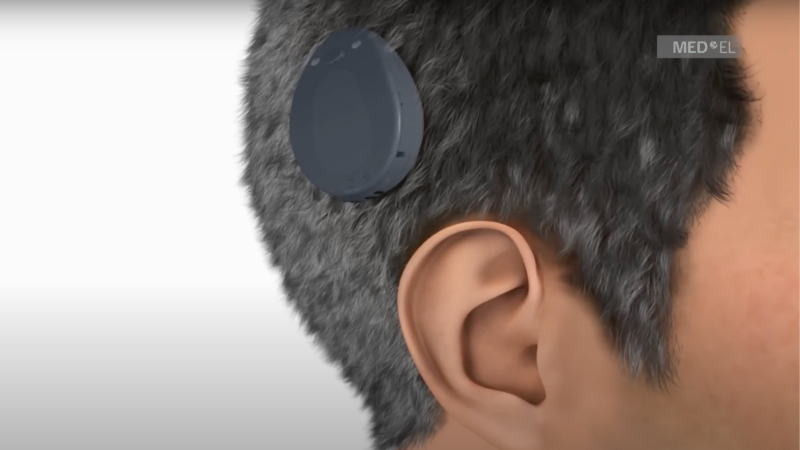MED-EL
Published Oct 28, 2015 | Last Update Aug 30, 2024
Meningitis and Hearing Loss: What to Do
Meningitis is an inflammation of the meninges, which are the layers that surround the brain and spinal cord. You have menges because they’re supposed to protect your nervous system, but unfortunately sometimes they can do the exact opposite: inflame and damage your nerves.

Meningitis affects both children and adults, and is the most common cause of acquired sensorineural hearing loss in children.1 Exactly how many meningitis infections will lead to hearing loss varies depending on who you ask, with studies showing it to be anywhere from 3.5% to 37.2%.Fortnum, H.M. (1992). Hearing impairment after Bacterial meningitis: a review. Arch Dis Child, 67(9): 1128–1133.[1]
How Meningitis Causes Hearing Loss
Meningitis causes hearing loss because it inflames parts of the ear. This inflammation can destroy parts of the cochlea, which is the tiny organ responsible for sending sound signals to your brain. Once this inflammation happens the cochlea can’t respond to sound waves and therefore the ear can’t hear.
This hearing loss happens fast, too: inflammation can come on as soon as 2 days after the meningitis starts.Van Loon, M.C., Hensen, E.F., de Foer, B., Smit, C.F., Witte, B., Merkus, P. (2013). Magnetic Resonance Imaging in the Evaluation of Patients With Sensorineural Hearing Loss Caused by Meningitis: Implications for Cochlear Implantation Otology & Neurotology, 34: 845–54[2] If left unchecked the whole cochlea can be ossified within a few months, which essentially means that its soft tissues are turned to bone and therefore don’t work. Ossification was found to start as early as 21 days after infection[3] and one scientific paper says 34% of people whose hearing loss was caused by meningitis reported ossification.[4]
What Can You Do?
Normal hearing happens because nerve cells in the cochlea send sound signals along the auditory nerve to the brain. If the meningitis causes hearing loss, hearing normally doesn’t come back because the soft tissues inside the cochlea start to turn to bone, and the nerve cells start to die.
In these cases, hearing aids usually aren’t strong enough to help so the typical treatment is a cochlear implant.Van Loon, M.C., Hensen, E.F., de Foer, B., Smit, C.F., Witte, B., Merkus, P. (2013). Magnetic Resonance Imaging in the Evaluation of Patients With Sensorineural Hearing Loss Caused by Meningitis: Implications for Cochlear Implantation Otology & Neurotology, 34: 845–54[2]
A cochlear implant reproduces sound in ears that don’t work for certain reasons, including meningitis-related ossification. Ossification means that the nerve cells will die over time if they don’t receive any electrical signals like the ones the hair cells sent. A cochlear implant can stimulate these nerve cells with electrical pulses, keeping them alive, and sends a signal along the auditory nerve in a way that’s similar to normal hearing.
It does this with what’s called an electrode array, a thin and flexible piece of silicone that’s inserted into the cochlea. The electrode array sits in the cochlea, so every time it sends a tiny electrical pulse this pulse is sent through the living nerve cells so they are ‘heard’ by your brain.
When’s the best time to receive a cochlear implant? As with almost all types of hearing loss, sooner is better. It doesn’t matter if you’re a 2 year old or 102; a shorter time between hearing loss and cochlear implantation can lead to better hearing with the cochlear implant.
MED-EL has the largest range of electrode arrays, even special electrode arrays specifically for ossified cochleae, and if you’re considering a cochlear implant then your surgeon will pick out the right electrode array.
Here are the stories of two people who lost their hearing due to complications from meningitis, and then received a MED-EL cochlear implant:
Chuckie Butler is a real-life Robocop
To learn more about cochlear implants, watch this video or visit www.medel.com:
Can’t open this video? Watch on Youtube.
References
-
[1]
Fortnum, H.M. (1992). Hearing impairment after Bacterial meningitis: a review. Arch Dis Child, 67(9): 1128–1133.
-
[2]
Van Loon, M.C., Hensen, E.F., de Foer, B., Smit, C.F., Witte, B., Merkus, P. (2013). Magnetic Resonance Imaging in the Evaluation of Patients With Sensorineural Hearing Loss Caused by Meningitis: Implications for Cochlear Implantation Otology & Neurotology, 34: 845–54
References
MED-EL
Was this article helpful?
Thanks for your feedback.
Sign up for newsletter below for more.
Thanks for your feedback.
Please leave your message below.
Thanks for your message. We will reply as soon as possible.
Send us a message
Field is required
John Doe
Field is required
name@mail.com
Field is required
What do you think?
© MED-EL Medical Electronics. All rights reserved. The content on this website is for general informational purposes only and should not be taken as medical advice. Contact your doctor or hearing specialist to learn what type of hearing solution suits your specific needs. Not all products, features, or indications are approved in all countries.
MED-EL



